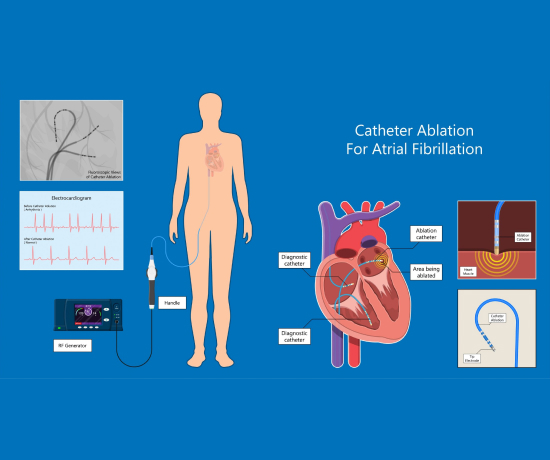Imagine your heart skipping a beat, not from love or fright, but due to Atrial Fibrillation. This condition does not just affect your pulse. It can shake up your whole state of being and even shorten your life. While some folks sense their heart’s erratic dance, others go about their days, clueless to the rapid rhythms within.
If you have had these symptoms, you may need an atrial fibrillation ablation in Chennai. Knowing the signs and roots of this heart condition is critical to keeping it in check. You are about to explore both, laying the foundation for a plan that could be a game changer for your heart health.
Understanding Atrial Fibrillation- Symptoms and Signs
Atrial Fibrillation, or AFib, tosses your heart’s beat into chaos, speeding it up and making it uneven. It could cause dizziness, breathlessness, and fatigue. Ever felt your heart do somersaults or a peculiar thumping? That is palpitations for you, a common sign of AFib. They might last just moments or stretch out for longer. Simply put, your chest might feel like It is hosting a fluttery creature or a flopping fish.
But here is the twist: AFib does not announce its presence to everyone. Some people might not feel a thing, living with a hidden, hurried heartbeat. This difference in experience means your daily life could be impacted in various ways, nudging you to stay alert to any heart or health changes.
Learning about what causes AFib is just as important as knowing the signs. It is the first stride towards taking the reins on your heart health.
Recognising an AFib Emergency- Immediate Medical Response
If AFib strikes, quick thinking could save a life. Look out for these urgent warning signs:
- Crushing chest pain spreading to your limbs, back, throat, or jaw, with a heavy feeling in the chest.
- Breathlessness, sweating, feeling sick, or lightheadedness with chest pain.
- A sudden, severe headache, particularly if it comes with bright red blood in your vomit or stool or intense stomach pain.
These are signs of a potential heart attack or major bleeding. Dial 911 straight away. In case of a stroke, be on guard for:
- Sudden weakness or numbness on one side.
- Confusion, speech troubles, or comprehension issues.
- Vision problems, dizziness, balance issues, or an unexplained headache.
These symptoms scream "stroke," and time is of the essence. For cardiac arrest, watch for:
- An abrupt fall or blacking out.
- Preceding this, chest pain, breathlessness, weakness, or heart flutters may occur.
Act fast if these symptoms arise. Being aware of these signs and knowing when to act is crucial. It is also a reminder to get clued up on the causes of AFib, which could lead to such dire situations.
Exploring the Causes of Atrial Fibrillation
AFibs causes are diverse and include several elements. Here is a rundown of the main culprits:
- Existing heart issues like damage from a past heart attack or valve disease.
- Lifestyle habits like overeating, heavy drinking, and smoking.
The heart’s wiring could go haywire in AFib, as rogue impulses hijack the normal signals from your heart’s built-in pacemaker.
Armed with this information, you will better grasp the complexity of AFib and the need to manage risks for your heart’s sake.
Atrial Fibrillation Risk Factors- Demographics and Prevalence
AFib touches many lives, with more men feeling its impact than women. Certain risks increase your odds of getting it. Here is what to look out for:
- Age and gender can hike up your AFib risk. (Men are more prone to AFib.)
- Health woes like high blood pressure or heart valve issues.
- Excessive caffeine or alcohol intake.
When pondering these risks, we must consider how AFib can mess with your heart’s electrical system and efficiency, which we will delve into next.
Atrial Fibrillation and Heart Health Bodily Effects
Understanding how AFib can mess with your heart is key. It scrambles the heart’s electric signals, making your beat fast and erratic.
Normally, your heart’s SA node keeps the beat steady. But AFib lets a storm of impulses take over, making the atria go haywire and beat out of sync. This can leave blood lingering in the heart, upping the risk of clots and strokes. So, it is vital to keep AFib in check.
Treatments range from meds to procedures like ablation or cardioversion. If you think you might have AFib, see a doctor immediately. Early action can help manage the condition and cut down on risks.
Understanding AFib’s signs, causes, and effects empowers you to seek care fast. It is key to keeping your ticker ticking right.
Taking Charge of Your Heart Health & Addressing AFib
Picture your heart as the conductor of your body's symphony. AFib can throw the whole concert out of whack, leading to real trouble. You have now got the lowdown on AFibs signs and triggers. But it is more than handling a health issue. It is about getting your life's rhythm back.
If you are sensing that odd flutter or want to be proactive about your heart health, expert help is close. Reach out to your electrophysiologist in Chennai, and get the support to restore your regular rhythm and a healthier you.

